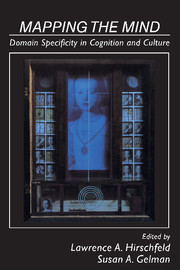Book contents
- Frontmatter
- Contents
- List of contributors
- Preface
- Part I Overview
- 1 Toward a topography of mind: An introduction to domain specificity
- Part II The origins of domain knowledge: Biology and evolution
- Part III The origins of domain knowledge: Conceptual approaches
- Part IV Are domains theories?
- Part V Domains across cultures and languages
- Part VI Implications for education
- Author index
- Subject index
1 - Toward a topography of mind: An introduction to domain specificity
Published online by Cambridge University Press: 04 August 2010
- Frontmatter
- Contents
- List of contributors
- Preface
- Part I Overview
- 1 Toward a topography of mind: An introduction to domain specificity
- Part II The origins of domain knowledge: Biology and evolution
- Part III The origins of domain knowledge: Conceptual approaches
- Part IV Are domains theories?
- Part V Domains across cultures and languages
- Part VI Implications for education
- Author index
- Subject index
Summary
Over the past decades, a major challenge to a widely accepted view of the human mind has developed across several disciplines. According to a long predominant view, human beings are endowed with a general set of reasoning abilities that they bring to bear on any cognitive task, whatever its specific content. Thus, many have argued, a common set of processes apply to all thought, whether it involves solving mathematical problems, learning natural languages, calculating the meaning of kinship terms, or categorizing disease concepts. In contrast to this view, a growing number of researchers have concluded that many cognitive abilities are specialized to handle specific types of information. In short, much of human cognition is domain-specific.
The notion of domain specificity is not new. Indeed, intriguing (although brief) hints of domain specificity emerge in the epistemologies of Descartes and Kant and in the psychologies of Thorndike, Vygotsky, and de Groot. For example, in Mind in Society, Vygotsky argues that
the mind is not a complex network of general capabilities such as observation, attention, memory, judgment, and so forth, but a set of specific capabilities, each of which is, to some extent, independent of others and is developed independently. Learning is more than the acquisition of the ability to think; it is the acquisition of many specialized abilities for thinking about a variety of things. Learning does not alter our overall ability to focus attention but rather develops various abilities to focus attention on a variety of things.
(1978: 83)Still, in recent years, increased and detailed attention has turned toward the question of domain specificity.
- Type
- Chapter
- Information
- Mapping the MindDomain Specificity in Cognition and Culture, pp. 3 - 36Publisher: Cambridge University PressPrint publication year: 1994
- 98
- Cited by



